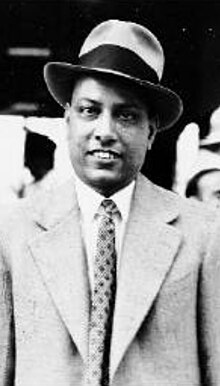Kasturbhai Lalbhai
| Kasturbhai Lalbhai | |
|---|---|

Kasturbhai in the 1940s before adopting khadi clothes
|
|
| Born |
19 December 1894 Ahmedabad |
| Died | 20 January 1980 (aged 85) Ahmedabad |
| Citizenship | India |
| Education | Metric |
| Alma mater | Ranchhodlal Chhotalal Government High School |
| Occupation | Industrialist |
| Years active | 1912–1977 |
| Organization | Arvind Mills |
| Spouse(s) | Sharda Chimanlal Jhaveri |
| Children | Shrenik, Siddharth |
| Parent(s) | Mohini and Lalbhai Dalpatbhai |
| Awards | Padma Bhushan |
Kasturbhai Lalbhai (19 December 1894 – 20 January 1980) was an Indian industrialist. He was widely perceived as a nationalist businessman akin to G. D. Birla. He co-founded the Arvind Mills along with his brothers and several other institutes.
He belong to the family of Nagarsheth (city chief) of Ahmedabad, recognised by the Mughals, Marathas and the English during different times.
He was the descendant of Shantidas Jhaveri, a royal jeweller of Akbar. Khushalchand (1680–1748), the grandson of Shantidas paid ransom to the Marathas to save Ahmedabad from plunder in 1725. Khushalchand's son Vakhatchand (1740–1814) was also a noted businessman. His grandfather Dalpatbhai Bhagubhai was also in cotton trading business in the 1870s. His father Lalbhai Dalpatbhai (1863–1912) established Saraspur cotton mill in 1896 addition to the traditional business of precious gems. It became a part of the swadeshi movement in India.
Kasturbhai was born to Mohini and Lalbhai Dalpatbhai, a Jain family, in 1894 in Jhaveriwad, Ahmedabad, Gujarat.
He studied at Municipal School Number Eight near Teen Darwaja, Ahmedabad up to fifth grade. He later joined Ranchhodlal Chhotalal Government High School. He matriculated in 1911 with second class. In 1912, when he was a 17-year-old studying in Gujarati College, his father died and being the second son, he was asked to discontinue his studies so as to help in the family business. His father Lalbhai had divided property among his brothers only in the recent past; as his and his sons' share, Lalbhai had received Raipur mills, a new establishment.
He was married to Sharda Chimanlal Jhaveri in May 1915 and had two sons, Shrenik and Siddharth.
He joined Raipur Mill as a chairman in 1912. The operations of the mill had not yet stabilised; hence, Kasturbhai had to take care of operations closely. He started off as a timekeeper in the mill, but fed up with the repetitive nature of the job, he started working with suppliers of the mill and travelled far and wide to understand the supplier market. The boom in demand during and post-World War I helped him in stabilising the operations of the firm. He joined the board of directors of Raipur mill in 1918. Later he established Ashoka Mills in the 1920s. He expanded business with help of then mentor and trusted general manager of all the textile mills Mr. Dahyabhai Motilal Patel who had the vision and insight to advise to invest in or acquire five mills between 1924 and 1938 including four belonging to relatives. These include establishment of Arvind Mills and Nutan Mills in 1931, Aruna Mills in 1928, Ahmedabad New Cotton Mills in 1938.Swadeshi movement by Mahatma Gandhi in the 1930s and starting of World War II in 1939 helped textile industry in India. He modernised all seven mills. They had 12% of India's total spinning capacity and 24% of Ahmedabad's total weaving capacity resulting in they were seventh largest cotton consumer in 1939 in India.
...
Wikipedia
